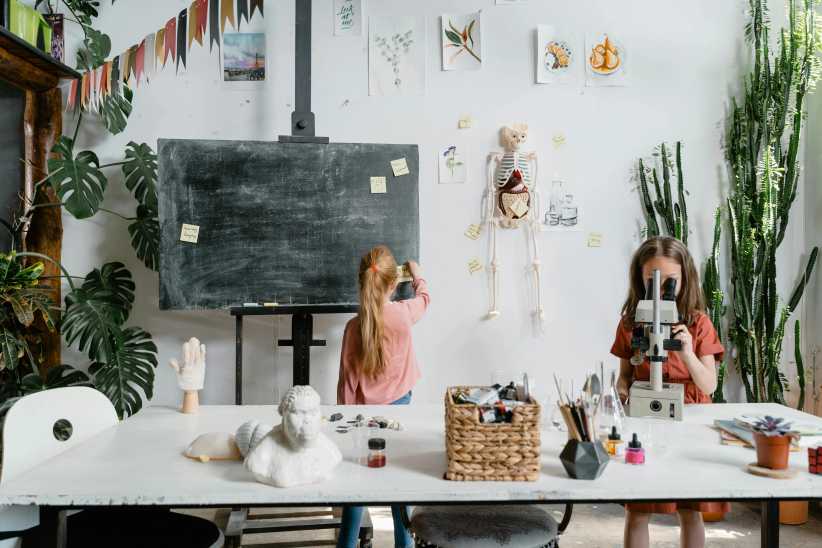Your child’s friends and relationships have more of an effect on his schoolwork and grades than you may think. Kids with a positive social life tend to perform better academically. Vera Borukhov, a Queens tutor and teacher, offers tips on how to help your child succeed in school by developing the right friendships.
 Who’s the biggest influence in your older child’s academic life? You probably think it’s you, or possibly your child’s favorite teacher. It’s not. While parents and teachers inspire, encourage, and even push teens and tweens to do well in school, kids in this age range typically look to their peers — friends, BFFs, boyfriends, girlfriends, or crushes — to guide their performance in school.
Who’s the biggest influence in your older child’s academic life? You probably think it’s you, or possibly your child’s favorite teacher. It’s not. While parents and teachers inspire, encourage, and even push teens and tweens to do well in school, kids in this age range typically look to their peers — friends, BFFs, boyfriends, girlfriends, or crushes — to guide their performance in school.
I’ve talked to teens. I’ve eavesdropped on their conversations and read their Facebook pages. And from what I’ve observed, teens tend to do as well in school as the important peers in their lives. They enroll in certain classes just to be with a good friend or a romantic interest. They may also attend certain classes only if the person they like is attending as well on that day.
Peers as Role Models
“You know she was the reason that I didn’t cut class. I would come in just to see her,” a student named Leon said to me at the end of the school year when we were shaking hands and saying goodbye and good luck to each other.
If their friends care about school and get good grades, they’ll push themselves to keep up. A so-so student may work hard to improve his grades if he starts dating an honor-roll student. One mother of a high school student told me: “All of a sudden I see a significant improvement in his grades. I’ve been talking to him about doing well in school for years, and now in his last two years of high school he improved so much.” Later she found out that her son had been dating a girl who was one of the top five students in the school.
On the other hand, if a child falls in with a crowd that couldn’t care less about school, she may deliberately slack off on her homework just to fit in with the group. One exceptionally bright young man, another former student, would often give insightful analysis in class, but only when called on. He never participated on his own, however, and he often communicated with his peers across the room in a sign language of his own design, acting silly. I realized that he purposely jokes and pretends to not be serious, just to fit in; his friends were clearly not as committed to their academics, and the effect was plausible.
In the 2000 movie Finding Forrester, the main character, Jamal, secretly studies and writes all the time. While spending time with his friends he plays basketball and rarely talks to them about school. When the teacher calls on him in class, he pretends to not know the answers. After achieving high scores on his exams, though, he transfers to a highly reputable academy. There he shows off all that he knows and competes in a writing contest. His new surroundings had a clear positive impact. Fiction here mirrors fact.
In a study earlier this year, which appeared in the Journal of Early Adolescence, researchers found that boys and girls whose friends are socially active in positive ways (including being respectful of rules) do better in their classroom work. Conversely, having friends who engage in problem behavior translates to a decrease in grades. The study, conducted by Drs. Marie-Helene Veronneau and Thomas J. Dishion of the University of Oregon Child and Family Center, focused solely on the role played by friendship on academic achievement.
The psychologists found that students who surround themselves with positively social friends and stay away from peers who chronically behave poorly proved more effective for academic payoffs than simply being friends with high-achieving peers.
Positive Reinforcement
Do you want your children to succeed in school? Then learn who their friends are, and encourage them to stick with the ones who love learning and are committed to doing well in school. Are you a teen who cares about excellence? Surround yourself with friends who feel the same way.
Now you may be wondering: How? How do I control who my child’s friends are and encourage that they become friends with the right people? The answer is: Talk, and have faith.
Consistently instilling in your children the importance of education will point them in the right direction. Explain the effect that our network of people has on us — and how it is important to sometimes change friends to make changes for the better in your life.
Don’t worry if your children accuse you of being annoying or meddlers. Consistent communication, as annoying as it may seem, serves its purpose. And be consistent with your message: Commenting on problematic friends once or twice is not enough, and instilling the value of surrounding oneself with the right people takes time. Think about this: Coke and McDonald’s sell as much as they do for a reason — they convey their message consistently, and often. We are inundated with their advertisements as they spread their message across all types of media. Your message to your children is that education is vital. Why not deliver it to them consistently, through various mediums?
And how will you know who their friends are? Consider using the Internet (Facebook and Google can be powerful tools). But perhaps a simpler idea: Feed them. They’re always hungry — so encourage them to invite friends over for a home-cooked meal, a snack of chips or fruit and nuts, or a pizza. And engage them while they’re there. Good old-fashioned conversation is still the best way to get to know someone.
Keep talking. Have faith, and remember to talk some more. You can do this!
Vera Borukhov is a certified secondary school English teacher and tutor in Queens. For more education resources, including helping reluctant students with Shakespeare, visit www.veracitylearning.com.
Also see: The Rise of Cheating: How to Keep Your Kids Academically Honest




















